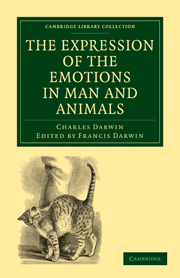Book contents
- Frontmatter
- PREFACE TO THE SECOND EDITION
- Contents
- LIST OF ILLUSTRATIONS
- INTRODUCTION
- CHAP. I GENERAL PRINCIPLES OF EXPRESSION
- CHAP. II GENERAL PRINCIPLES OF EXPRESSION—continued
- CHAP. III GENERAL PRINCIPLES OF EXPRESSION—concluded
- CHAP. IV MEANS OF EXPRESSION IN ANIMALS
- CHAP. V SPECIAL EXPRESSIONS OF ANIMALS
- CHAP. VI SPECIAL EXPRESSIONS OF MAN: SUFFERING AND WEEPING
- CHAP. VII LOW SPIRITS, ANXIETY, GRIEF, DEJECTION, DESPAIR
- CHAP. VIII JOY, HIGH SPIRITS, LOVE, TENDER FEELINGS, DEVOTION
- CHAP. IX REFLECTION—MEDITATION—ILL-TEMPER—SULKINESS—DETERMINATION
- CHAP. X HATRED AND ANGER
- CHAP. XI DISDAIN — CONTEMPT — DISGUST — GUILT — PRIDE, ETC. — HELPLESSNESS — PATIENCE — AFFIRMATION AND NEGATION
- CHAP. XII SURPRISE—ASTONISHMENT—FEAR—HORROR
- CHAP. XIII SELF-ATTENTION—SHAME—SHYNESS—MODESTY: BLUSHING
- CHAP. XIV CONCLUDING REMARKS AND SUMMARY
- INDEX
- Plate section
CHAP. VII - LOW SPIRITS, ANXIETY, GRIEF, DEJECTION, DESPAIR
Published online by Cambridge University Press: 07 September 2010
- Frontmatter
- PREFACE TO THE SECOND EDITION
- Contents
- LIST OF ILLUSTRATIONS
- INTRODUCTION
- CHAP. I GENERAL PRINCIPLES OF EXPRESSION
- CHAP. II GENERAL PRINCIPLES OF EXPRESSION—continued
- CHAP. III GENERAL PRINCIPLES OF EXPRESSION—concluded
- CHAP. IV MEANS OF EXPRESSION IN ANIMALS
- CHAP. V SPECIAL EXPRESSIONS OF ANIMALS
- CHAP. VI SPECIAL EXPRESSIONS OF MAN: SUFFERING AND WEEPING
- CHAP. VII LOW SPIRITS, ANXIETY, GRIEF, DEJECTION, DESPAIR
- CHAP. VIII JOY, HIGH SPIRITS, LOVE, TENDER FEELINGS, DEVOTION
- CHAP. IX REFLECTION—MEDITATION—ILL-TEMPER—SULKINESS—DETERMINATION
- CHAP. X HATRED AND ANGER
- CHAP. XI DISDAIN — CONTEMPT — DISGUST — GUILT — PRIDE, ETC. — HELPLESSNESS — PATIENCE — AFFIRMATION AND NEGATION
- CHAP. XII SURPRISE—ASTONISHMENT—FEAR—HORROR
- CHAP. XIII SELF-ATTENTION—SHAME—SHYNESS—MODESTY: BLUSHING
- CHAP. XIV CONCLUDING REMARKS AND SUMMARY
- INDEX
- Plate section
Summary
After the mind has suffered from an acute paroxysm of grief, and the cause still continues, we fall into a state of low spirits; or we may be utterly cast down and dejected. Prolonged bodily pain, if not amounting to an agony, generally leads to the same state of mind. If we expect to suffer, we are anxious; if we have no hope of relief, we despair.
Persons suffering from excessive grief often seek relief by violent and almost frantic movements, as described in a former chapter; but when their suffering is somewhat mitigated, yet prolonged, they no longer wish for action, but remain motionless and passive, or may occasionally rock themselves to and fro. The circulation becomes languid; the face pale; the muscles flaccid; the eyelids droop; the head hangs on the contracted chest; the lips, cheeks, and lower jaw all sink downwards from their own weight. Hence all the features are lengthened; and the face of a person who hears bad news is said to fall. A party of natives in Tierra del Fuego endeavoured to explain to us that their friend, the captain of a sealing vessel, was out of spirits, by pulling down their cheeks with both hands, so as to make their faces as long as possible. Mr. Bunnet informs me that the Australian aborigines when out of spirits have a chop-fallen appearance. After prolonged suffering the eyes become dull and lack expression, and are often slightly suffused with tears.
- Type
- Chapter
- Information
- The Expression of the Emotions in Man and Animals , pp. 186 - 206Publisher: Cambridge University PressPrint publication year: 2009First published in: 1890

